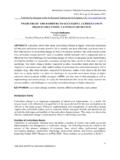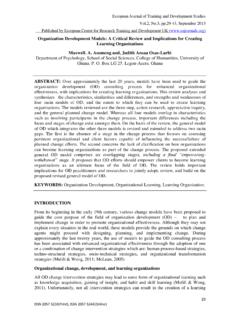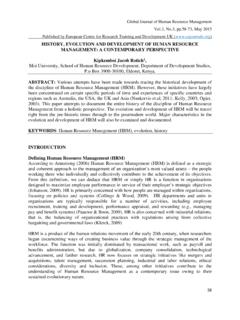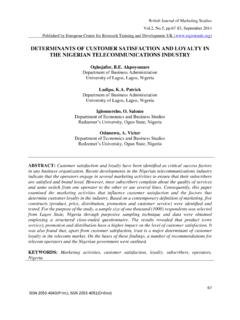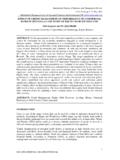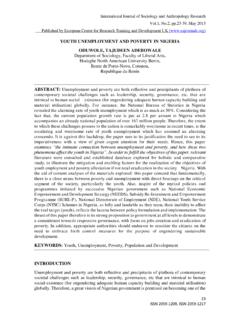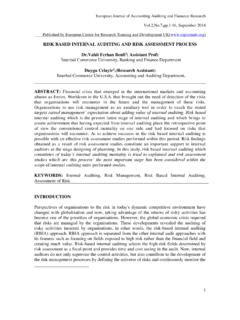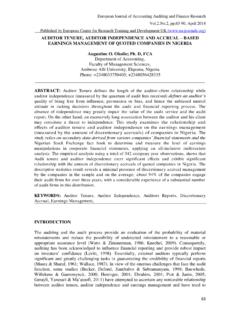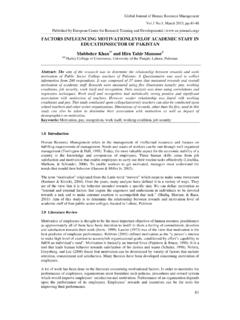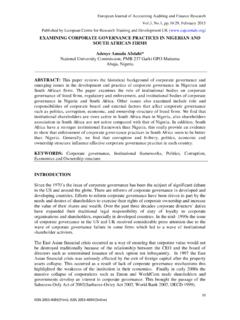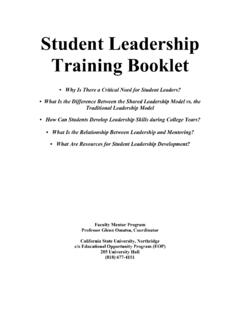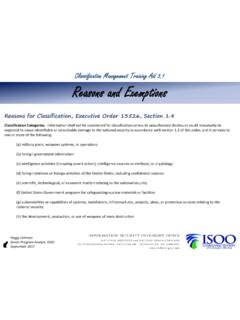Transcription of THE RELATIONSHIP BETWEEN RELIGION AND MORALITY: …
1 Global Journal of Arts, Humanities and Social Sciences , , , September 2018 ___Published by European Centre for Research training and development UK ( ) 42 Print ISSN: 2052-6350(Print), Online ISSN: 2052-6369(Online) THE RELATIONSHIP BETWEEN RELIGION AND MORALITY: ON WHETHER THE MULTIPLICITY OF RELIGIOUS DENOMINATIONS HAVE IMPACTED POSITIVELY ON SOCIO-ETHICAL BEHAVIOR Emmanuel Kelechi Iwuagwu ( ) Department of Philosophy, University of Calabar. Calabar, Nigeria ABSTRACT: Morality until recently has been seen as a brainchild of RELIGION and thus an essential part of RELIGION from which it is inseparable. This assumption has even led some scholars to hold that there can be no morality without RELIGION since morality is intrinsically a part of RELIGION . It is therefore assumed that a religious person is essentially a moral person and that a moral life may not be possible without RELIGION .
2 If this assumption is upheld it will mean that with the multiplicity of major religious denominations the world will be a better place. Whether this is so is an issue that elicits fierce divergent views among scholars and people of various orientations. This works critically examines the RELATIONSHIP BETWEEN RELIGION and morality to determine whether the above claims and expectations are justified. Employing the philosophical tools of critical analysis, exposition and evaluation of facts experientially acquired as well as information from the works of researchers on the issues of RELIGION and morality, the work examines whether there is a definitional RELATIONSHIP or connection BETWEEN RELIGION and morality and whether they are related through their concerns, preoccupations or constituent elements. This connection was not seen. The work further examined the opinions of scholars with regard to their RELATIONSHIP as well as what the consequences will be if ethics depends on RELIGION .
3 In trying to find out the root of the assumption the work critically examined the contentious issue of the impact of the multiplicity of religious denominations on socio-ethical behavior. In conclusion the work decried the lack of synergy BETWEEN morality and RELIGION , holding that though there may be no definitional connection BETWEEN them and their concerns, preoccupations and constituent elements may differ, morality and RELIGION are complimentary in forging a better society. If they synergize their efforts the world will be a better place. KEYWORDS: RELIGION , Morality, Socio-Ethical Behavior, Religious Denominations. INTRODUCTION The critical question of the RELATIONSHIP BETWEEN RELIGION and Morality which has been an old pre-occupation of western philosophy has currently re-surfaced on the philosophical front burner. This question has elicited variety of opinions differing from the traditionally held opinions from Greek philosophy, Judaism, Christianity and other religious confessions that RELIGION and morality are closely interwoven and thus inseparable.
4 With regard to this perennial and topical question of whether or not morality requires RELIGION , Socrates in Plato s work Euthyphro posed the famous question of whether goodness is loved by the gods because it is good or whether goodness is good because it is loved by the gods. Although Socrates favored the former proposal, many other scholars have argued that morality is unthinkable without God. Dostoevsky, for instance, insists that if God does not exist, everything is permitted. Global Journal of Arts, Humanities and Social Sciences , , , September 2018 ___Published by European Centre for Research training and development UK ( ) 43 Print ISSN: 2052-6350(Print), Online ISSN: 2052-6369(Online) Before the modern period of philosophy, it was generally agreed that RELIGION is the indisputable foundation of morality, thereby implying that without RELIGION there can be no morality. This widespread and deeply ingrained notion that RELIGION is a precondition for morality is still being held today as is promoted by scholars like Laura Schlesinger who insists that morality is impossible without believe in God and Zuckerman who claims that declining moral standards are at least partly attributable to the rise of secularism and decline of organized RELIGION .
5 This assumption and all built upon it no longer appears very strong because some other modern and contemporary scholars have argued with facts that many religious doctrines and practices have failed the test of morality, hence the argument that RELIGION is neither necessary nor sufficient for morality (Pierre Bayle). This view contradicts the age long position that morality has divine origin: either God created man with moral sensibility or man acquired the knowledge of good and evil, right and wrong from lessons learnt from religious teachings. The moral crisis being experienced in our contemporary world in spite of the multiplicity of religious denominations raises a greater objection with regard to the impact of RELIGION on morality. If RELIGION has such great influence on morality, one may ask, why the moral decadence beclouding our present day society where moral values are being discarded in spite of the very loud, clear and sustained preaching by uncountable religious denominations in virtually every corner of our contemporary society.
6 This work employing the philosophical tools of critical analysis, exposition and evaluation of facts experientially acquired as well as information from the works of researchers on the issues of RELIGION and morality, examines whether there is a definitional RELATIONSHIP or connection BETWEEN RELIGION and morality and whether they are related through their concerns, preoccupations or constituent elements. The work also explores the various shades of opinion regarding the RELATIONSHIP BETWEEN RELIGION and morality, the consequences of morality s dependence on RELIGION , the synergy BETWEEN RELIGION and morality as well as the impact, if any, of RELIGION on socio-ethical behavior. In conclusion the work calls for a complimentary RELATIONSHIP BETWEEN RELIGION and morality recommending that there should be a synergy BETWEEN them in building a peaceful, just and egalitarian society.
7 Definitions of RELIGION and Morality Both from the etymological definition and their regular usage the definitions and meaning of RELIGION and morality (ethics) have no close affinity or semblance. Both have different value system with morality based on reason while RELIGION is based on faith. With regard to the Etymology of the word RELIGION , St. Thomas Aquinas proposes three Latin root words; religio, reeligere and religare which were used by Isidore and St. Augustine. Isidore says according to Cicero, a man is said to be religious from religio, because he often ponders over and as it were, reads again (relegit) the things which pertain to the worship of God (Etym. x). For St. Augustine RELIGION may take its name from the fact that we ought to seek God again, whom we had lost by our neglect (De Civ. Dei x, 3). (St. Augustine plays on the words reeligere, to choose over again and negligere to neglect or despise).
8 For St. Augustine also RELIGION may be derived from religare (to bind together). He says may RELIGION bind us to the one Almighty God (De Vera. Relig 55). Employing the three Latin words above; religio, reeligere and religare St. Thomas Aquinas concluded that RELIGION denotes properly a relation to God. For it is he to whom we ought to be bound as to our unfailing principle, to whom also our choice should be resolutely directed Global Journal of Arts, Humanities and Social Sciences , , , September 2018 ___Published by European Centre for Research training and development UK ( ) 44 Print ISSN: 2052-6350(Print), Online ISSN: 2052-6369(Online) as to our last end; and to whom we lose when we neglect Him by sin, and should recover by believing in Him and confessing our faith (Summa II- II, Q. 81, Art. 1). From the foregoing, not being oblivious of many other definitions of RELIGION , one can say that RELIGION consists of a system of beliefs and practices that admits a binding relation to a supernatural Being or beings.
9 RELIGION entails man s RELATIONSHIP with a deity or divinity, with the human being as the inferior partner in the RELATIONSHIP . On the other hand morals and morality, which are understandably interchangeable with ethics because of their common etymological origin, is derived from the Latin word mos (plural mores) which means custom or habit which is the equivalent of the Greek word ethos which also means custom or habit . The two terms morality and ethics are roughly interchangeable in contemporary usage though some scholars try to demarcate them. For McClendon; when a distinction is made morals nowadays refers to actual human conduct viewed with regards to right and wrong, good and evil, ethics refers to a theoretical overview of morality, a theory or system or code. In this sense, our morality is the concrete human reality that we live out from day to day, while ethics is an academic view gained by taking a step back and analyzing or theorizing about (any) morality (45-46).
10 This compartmentalization by McClendon is surely defective. A better clarification of the terms morality and ethics arising from their root words is provided by Fagothey who used them interchangeably without making much fuss about their difference. According to Fagothey by derivation of the words, ethics (ethos) and morals (mos) study human customs some of which are mere conventions, such as table manners, mode of dress, forms of speech and expression of courtesy which vary from place to place and at different times. For Fagothey these are manners, not morals . But there are other customs that seem more fundamental such as telling the truth, paying our debts, honoring our parents and respecting the lives and properties of others. These conducts are not only customary but right and to deviate from them would be wrong. These, says Fagothey, are morals and it is these alone that ethics deals with.
